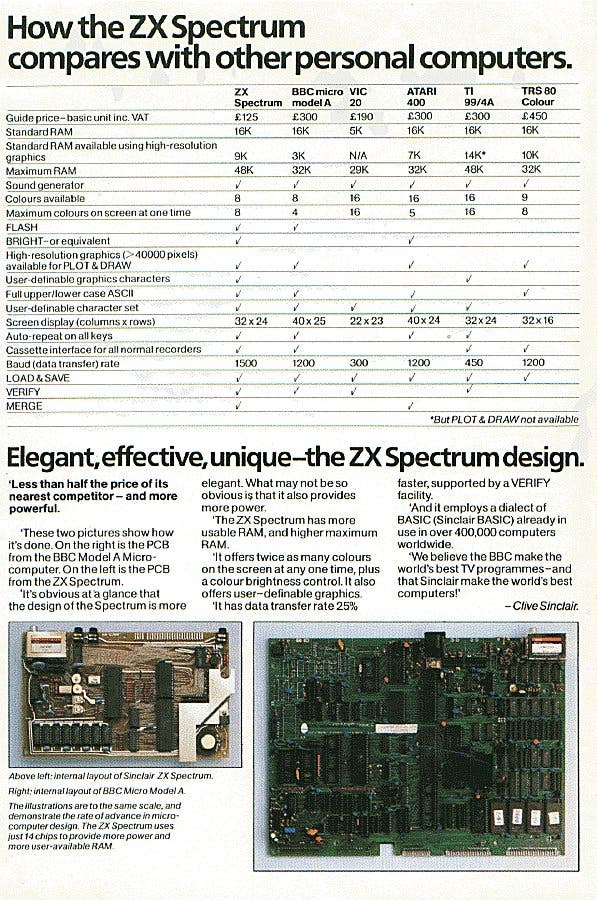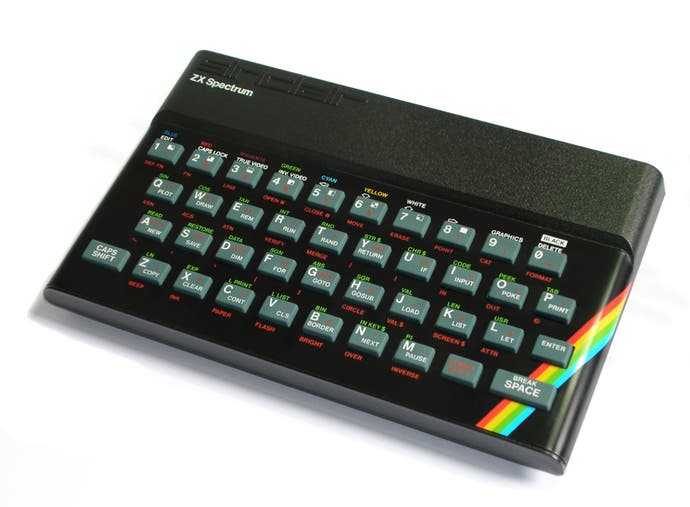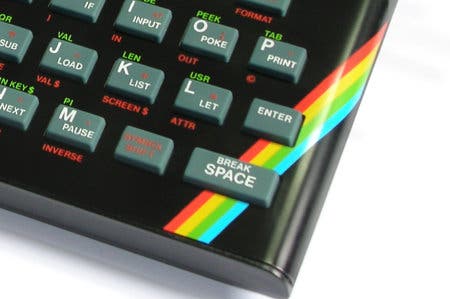Happy 30th birthday, ZX Spectrum
The cheaper, "more elegant" home computer.
30 years ago today, the ZX Spectrum was born, and some of you still bang on about it.
That's because it was brilliant and cheap (£125/£175) - much cheaper than rivals BBC Micro (£299/£399) and Commodore 64 (£229). This helped the ZX Spectrum become the UK's best selling computer.
"It's obvious at first glance that the design of the Spectrum is more elegant," Sir Clive Sinclair declared in an advert at the time (posted by ZXPlanet). "What may not have been so obvious is that it also provided more raw power.

"The ZX Spectrum has more usable RAM. It offers twice as many colours on the screen at any one time, plus a colour brightness control. It also offers user definable graphics. It has a data transfer rate 25 per cent faster, supported by a VERIFY facility. And it employs a dialect of BASIC (Sinclair BASIC) already in use in over 400,000 computers worldwide.
"We believe the BBC makes the best TV programmes," he added, "and that Sinclair makes the best computers."
"We believe the BBC makes the best TV programmes, and that Sinclair makes the best computers."
Sir Clive Sinclair, from '80s advertising material
BBC News interviewed ZX Spectrum engineer Richard Altwasser, and industrial designer Rick Dickinson, to mark the occasion.
"I clearly recall having discussions that a time would come when every home would have a computer," Altwasser remembered. "We could see the applications and uses for everyday purposes.
"We'd have these discussions with friends and family and people outside the computer club in Cambridge and people would scoff and say: 'Why on earth would a family want a computer in the home?'
"The success was I think beyond anyone's expectation. But perhaps with hindsight it wasn't totally unpredictable.
The makers had anticipated a movement of home programming, but soon discovered that "clearly a lot of people wanted to use the computer for playing games", Altwasser said.
Dickinson added: "In the earlier days there was a mild disappointment that we were launching computers and not games machines. But I think the games market eventually turned our machines into games products.

"Clearly a lot of people wanted to use the computer for playing games."
Richard Altwasser, engineer, ZX Spectrum
"Once the company accepted that, Sir Clive realised that it was the clear route to one's bread and butter. There were a lot of companies set up writing games for the Spectrum, and we also approached companies and writers specifically to make our own in-house games."
Talk then returned to the present and to the Raspberry Pi, the cheap-as-chips PC developed to invoke the home programming success of computers like the ZX Spectrum.
Altwasser said the Pi has graphics 140 times better, processing speeds 200 times greater and thousands of times more memory than the ZX Spectrum. This should give it "every possible advantage" of being as successful. "But my impression is that the attention span of young people over the last 30 years has probably not lengthened," he said.
To celebrate 30 years of the beloved ZX Spectrum - all saucy black and grey curves with a flirty splash of rainbow colour - enterprising boffins have gotten Twitter up and running on it. Look, here's a video.

